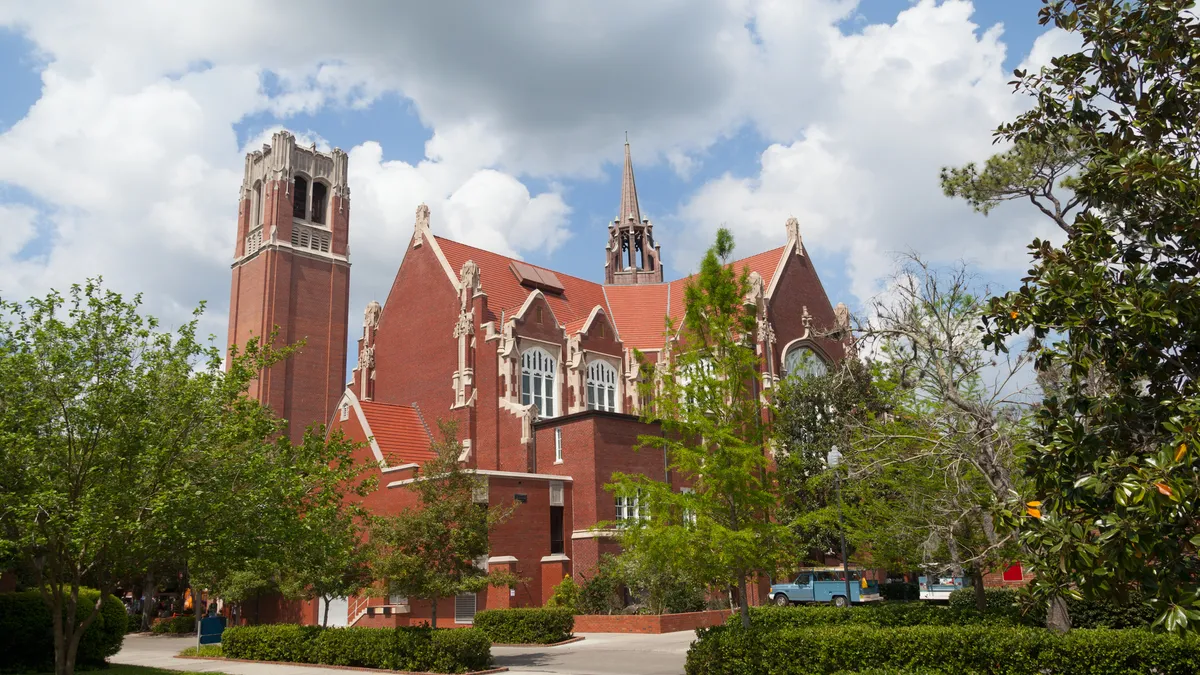UPDATE: Dec. 10, 2021: University of Florida faculty leaders and the institution's president have developed a new arrangement that they say will help safeguard free speech and academic freedom after weeks of national scrutiny.
The deal focuses on five areas of contention, the Tampa Bay Times reported. A scandal emerged at Florida's flagship institution when it was reported this fall that officials denied three professors the opportunity to testify in a lawsuit against the state's new restrictive voting rights law.
Agreed-upon changes include creating an appeal process for the university's conflict of interest policy and installing faculty on committees to review decisions related to that rule, according to the publication.
The administration will also affirm faculty have the right to speak to the press as private citizens, have the right to conduct research without outside interference, and that they will have control over their course materials.
A university official also said the institution would investigate allegations that research data related to COVID-19 was destroyed when working with a state agency, as described in the faculty senate report.
Dive Brief:
- University of Florida instructors feel a need to self-censor, according to a new faculty report detailing allegations about barriers to research, restrictions on outside activities and pressure to alter course content.
- A faculty senate committee fielded wide-ranging reports from academics, including from those who were nervous pursuing race-related research or were asked to alter proposed curricula to avoid clashes with state policymakers.
- Researchers were also reportedly pressured to destroy coronavirus-related data when working with an unidentified state entity, the report says. These revelations follow several scandals over faculty free inquiry that prompted twin investigations from the university's accreditor and a congressional panel.
Dive Insight:
The committee report is the latest salvo in a closely watched struggle between the limits of academic freedom and U.S. public institutions' interest in pleasing policymakers — as well as how administrators navigate conflict between the two.
The saga at U of Florida began in late October, when reports surfaced that the university blocked three professors from testifying in a lawsuit against the state over a new law restricting voting rights.
University officials said the faculty members' participation would conflict with institutional interests. Following national uproar, the administration relented, at first allowing the professors to work on the case if they were unpaid, and then saying they could be compensated as long as they were on their own time and did not tap university resources.
Despite the concessions, the three professors sued, alleging free speech violations. Three other academics at the university then signed onto the lawsuit, also arguing officials had restricted their involvement in court proceedings.
The university formed a task force to study its conflict of interest policy and offer recommendations, but it was criticized as a political ploy that would not deliver results. The task force had recommended, and the university's president accepted, that officials affirm faculty free speech rights and that there be a "presumption" that the institution will allow employees to testify in lawsuits in which the state is a party.
It also suggested the university set up an appeals process for denials of such requests.
More recently, a professor filed a grievance with the faculty union alleging he was instructed to change the title of his curriculum about "Critical Studies in Race, Ethnicity, and Culture" because it contained "critical" and "race" in proximity. The professor said college leaders feared igniting a political battle with Republicans, who have railed against critical race theory, a 40-year-old academic construct that in part teaches racism is systemic.
The faculty senate's new report adds fuel to the nationwide debate over academic freedom.
Employees were told not to criticize institutional policies or the state's Republican governor in the press, faculty told committee members.
"More problematic than the individual examples of pressure to stifle unpopular viewpoints or restrict research was the palpable reticence and even fear on the part of faculty to speak up on these issues," the report says. "There was grave concern about retaliation and a sense that anyone who objected to the state of affairs might lose his or her job or be punished in some way."
The report states administrators' responses do not address systemic problems the committee identified. Specifically, a recent revision of the university's conflicts of interest policy "does not address the serious reports of efforts to stifle the scientific and medical community's research into and professional duty to report the developing scientific information on Covid-19," the report says
The U of Florida did not respond to a request for comment on Tuesday.
Recently, Mori Hosseini, the chair of the university's board of trustees, at a public meeting accused some professors of abusing their positions to advocate political views.
Hosseini said neither the board nor legislators would continue to tolerate faculty members' alleged misbehavior.
Florida's governor appoints six of the university's trustees, and the State University System of Florida Board of Governors names five more. Most of the system board is also appointed by the governor.














